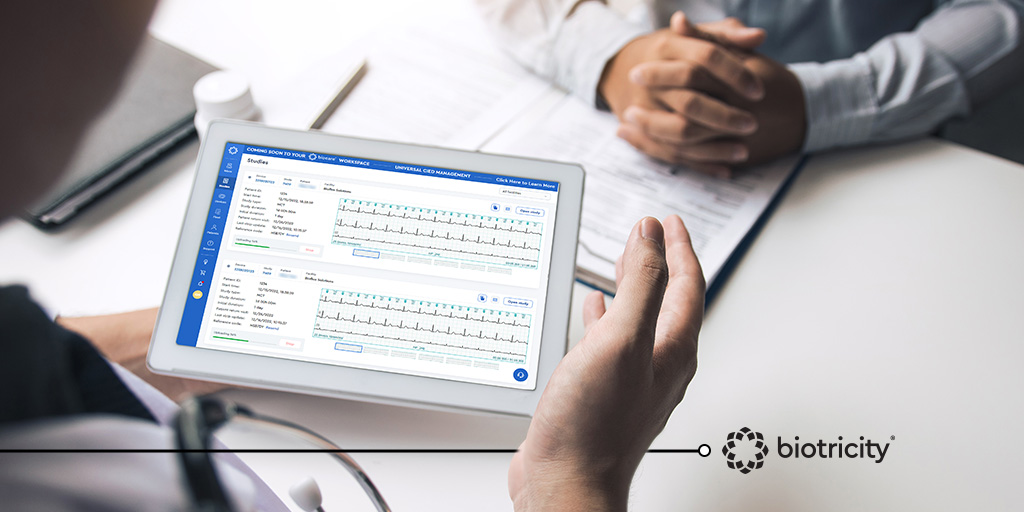Supporting Patient Health and Well-Being
Our remote monitoring devices optimize patient and healthcare provider workflows. Redefining healthcare to work for you to deliver critical insights to a patient’s health, resulting in quicker treatment.
Every Heartbeat Matters
Only with Biotricity’s advanced hardware and software solutions can you accurately identify cardiac problems when they occur. Our solutions like Bioflux make this possible with continuous smart ECG monitoring, making it one of the most accurate monitors for detecting key cardiac issues.
Improve your practice’s efficiency with Biotricity
Setting New Standards
Our solutions are transformational for both clinics and patients. Physicians can see results in real time with reports back in days rather than weeks. Patients wear easy to use, discreet devices while having the confidence they’re being monitored.
0 Billion
Beats Recorded


More than
0K+
Atrial Fibrillation Diagnoses

Trusted by over
0K+
Patients

0 Billion
Beats Recorded

More than
0K+
Atrial Fibrillation Diagnoses

Trusted by over
0K+
Patients
Ready to learn more?
With the right data, patients can take control of their health.
Diagnostic
Tools
• Monitor
• Record
• Transmit
Disease Management
• Measure Vitals
• Share
Lifestyle Management
• Monitor
• Record
• Share














Physician
• Analyze
• Interpret
• Diagnose
Faster Diagnosis
We focus on efficiency, accuracy and two-way data flow to improve the speed to diagnosis.
Monitor and Collect
With the right information, patients get treated faster.
Quality of Care
We make it easier to collect and review health data to improve outcomes and the quality of care.
With the right data, patients can take control of their health.
Monitor
Record
Transmit





Physician
Analyze
Interpret
Diagnose
Faster Diagnosis
We focus on efficiency, accuracy and two-way data flow to improve the speed to diagnosis.
Monitor and Collect
With the right information, patients get treated faster.
Quality of Care
We make it easier to collect and review health data to improve
outcomes and the quality of care.
Monitor
Record
Transmit





Physician
Analyze
Interpret
Diagnose
Faster Diagnosis
We focus on efficiency, accuracy and two-way data flow to improve the speed to diagnosis.
Monitor and Collect
With the right information, patients get treated faster.
Quality of Care
We make it easier to collect and review health data to improve
outcomes and the quality of care.
Monitor
Record
Transmit




Physician
Analyze
Interpret
Diagnose
Faster Diagnosis
We focus on efficiency, accuracy and two-way data flow to improve the speed to diagnosis.
Monitor and Collect
With the right information, patients get treated faster.
Quality of Care
We make it easier to collect and review health data to improve
outcomes and the quality of care.
Improve your practice’s efficiency with Biotricity
Bioflux Overview
Bioflux® is a smart mobile device that is revolutionizing remote cardiac monitoring. Capturing and transmitting ECG data, Bioflux constantly analyzes ECG data while continuously uploading to Biotricity’s cloud in case of anomalies.
Faster Diagnosis
With built-in connectivity, Bioflux ensures diagnosis within days not weeks.
3 Channel
With Bioflux, 3 channels are monitored at all times. This built-in redundancy helps ensure a successful study.
Integrated SIM card
Bioflux’s integrated SIM card allows the data to automatically transmit via cellular networks. With built in connectivity, there is no need for the patient to connect via their phone.
Biotres Overview
Biotres is a revolutionary cardiac monitor that solves the challenges with existing cardiac solutions by improving care delivery while reducing patient risk and physician liability. Using 3 channels to record ECG data, Biotres supports up to 30 days of recording and delivers results in 3-5 days rather than 2-3 weeks.
Data Quality
Small, lightweight, wireless device with 3 Channel capability for more accurate studies when compared with 1 channel patch devices.
Faster Diagnosis
Patient data is available within 3-5 days instead of weeks, improving quality of care while reducing patient risk.
Connectivity
Patient data is transmitted via Bluetooth connectivity automating manual clinic workflows and speeding up data access.
Bioheart Overview
Bioheart incorporates the same technology as Bioflux, with the same truly continuous (24/7) tracking available directly to consumers –a first in the market. Bioheart’s continuous monitoring capabilities make it a ground-breaking lifestyle management solution that helps users track, optimize, manage, and learn about their heart.
Continuous Heart Rate Monitoring
Bioheart records your heart activity continuously while you wear it, giving you reliable, 24/7 data to deliver the most accurate insights on your heart.
Unlimited Heart Data
Bioheart is always recording your data while you wear it, giving you unlimited data on your heart so you can capture any and all insights into your heart activity.
Retrospective Snapshot
You have complete access to your data history. Easily retrieve snapshots of your heart activity from past days, months, and even years –from anytime you’ve worn Bioheart.
Biokit Overview
Biokit is the complete remote patient monitoring solution for your practice. Biokit is a personal remote monitoring kit which enables individuals to collect multiple data points on temperature, blood pressure, and blood oxygen levels – creating a more holistic view of their health for physicians to better manage their patients.
Pulse Oximeter
The Pulse oximeter measures the level of oxygen saturation in the blood, providing insight into breathing and lung function.
Blood Pressure Cuff
The blood pressure cuff allows users to take their own blood pressure quickly and easily.
Thermometer
The thermometer provides fast, touchless results for body temperature.
























